Ethical Practice in Hospitality Sector: Decision Making Essay
VerifiedAdded on 2022/12/28
|7
|2117
|26
Essay
AI Summary
This essay delves into the critical importance of ethical practices within the hospitality sector, focusing on ethical decision-making models and their real-world applications. It begins by establishing the significance of business ethics and its impact on organizational success, emphasizing the need for companies to adhere to strong ethical principles to build trust with stakeholders. The essay then explores both traditional ethical decision-making principles, such as utilitarianism, rights, fairness, common good, and virtue, and the modern ethical breakdowns model proposed by Bazerman and Tenbrunsel, which identifies five barriers to ethical behavior: ill-conceived goals, motivated blindness, indirect blindness, the slippery slope, and overvaluing outcomes. The essay applies these models to ethical scenarios within the hospitality industry, such as supplier relationships, HR practices, and property management, to compare their effectiveness. Through case studies and examples, the essay highlights how organizations can limit unethical decisions and promote a culture of ethical leadership, ultimately contributing to improved service quality, customer satisfaction, and long-term sustainability in the hospitality sector. It also references key academic sources to support its arguments.
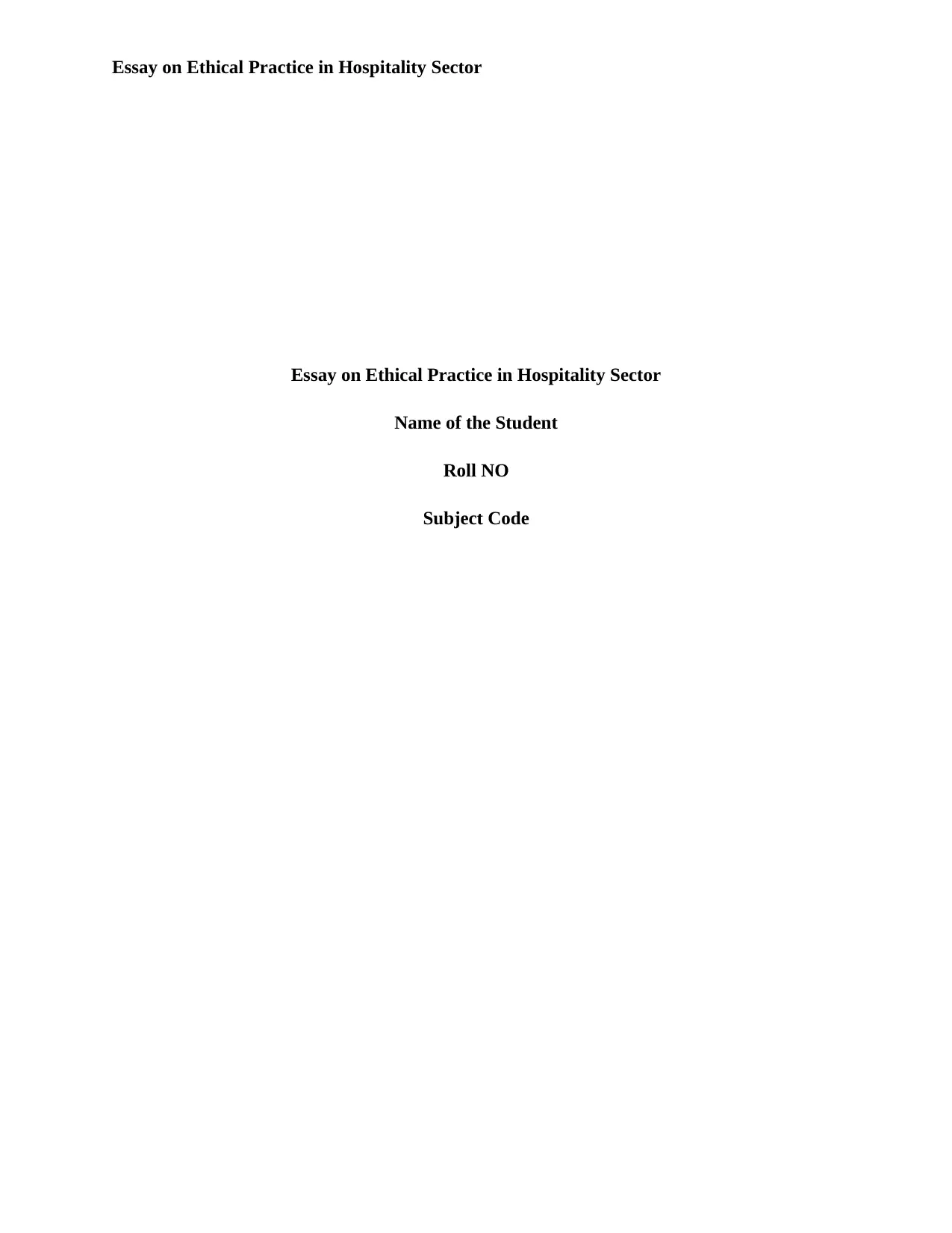
Essay on Ethical Practice in Hospitality Sector
Essay on Ethical Practice in Hospitality Sector
Name of the Student
Roll NO
Subject Code
Essay on Ethical Practice in Hospitality Sector
Name of the Student
Roll NO
Subject Code
Paraphrase This Document
Need a fresh take? Get an instant paraphrase of this document with our AI Paraphraser
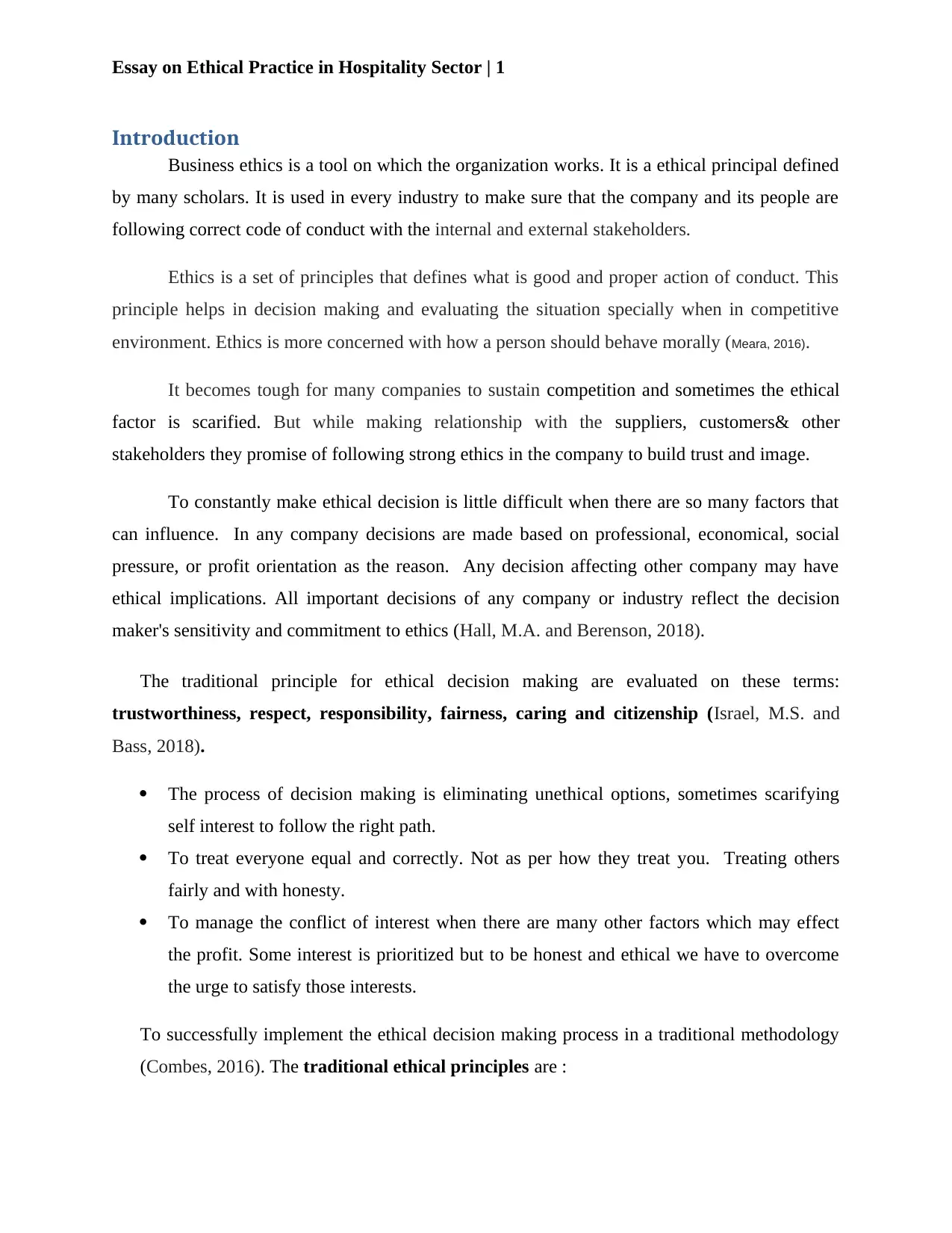
Essay on Ethical Practice in Hospitality Sector | 1
Introduction
Business ethics is a tool on which the organization works. It is a ethical principal defined
by many scholars. It is used in every industry to make sure that the company and its people are
following correct code of conduct with the internal and external stakeholders.
Ethics is a set of principles that defines what is good and proper action of conduct. This
principle helps in decision making and evaluating the situation specially when in competitive
environment. Ethics is more concerned with how a person should behave morally (Meara, 2016).
It becomes tough for many companies to sustain competition and sometimes the ethical
factor is scarified. But while making relationship with the suppliers, customers& other
stakeholders they promise of following strong ethics in the company to build trust and image.
To constantly make ethical decision is little difficult when there are so many factors that
can influence. In any company decisions are made based on professional, economical, social
pressure, or profit orientation as the reason. Any decision affecting other company may have
ethical implications. All important decisions of any company or industry reflect the decision
maker's sensitivity and commitment to ethics (Hall, M.A. and Berenson, 2018).
The traditional principle for ethical decision making are evaluated on these terms:
trustworthiness, respect, responsibility, fairness, caring and citizenship (Israel, M.S. and
Bass, 2018).
The process of decision making is eliminating unethical options, sometimes scarifying
self interest to follow the right path.
To treat everyone equal and correctly. Not as per how they treat you. Treating others
fairly and with honesty.
To manage the conflict of interest when there are many other factors which may effect
the profit. Some interest is prioritized but to be honest and ethical we have to overcome
the urge to satisfy those interests.
To successfully implement the ethical decision making process in a traditional methodology
(Combes, 2016). The traditional ethical principles are :
Introduction
Business ethics is a tool on which the organization works. It is a ethical principal defined
by many scholars. It is used in every industry to make sure that the company and its people are
following correct code of conduct with the internal and external stakeholders.
Ethics is a set of principles that defines what is good and proper action of conduct. This
principle helps in decision making and evaluating the situation specially when in competitive
environment. Ethics is more concerned with how a person should behave morally (Meara, 2016).
It becomes tough for many companies to sustain competition and sometimes the ethical
factor is scarified. But while making relationship with the suppliers, customers& other
stakeholders they promise of following strong ethics in the company to build trust and image.
To constantly make ethical decision is little difficult when there are so many factors that
can influence. In any company decisions are made based on professional, economical, social
pressure, or profit orientation as the reason. Any decision affecting other company may have
ethical implications. All important decisions of any company or industry reflect the decision
maker's sensitivity and commitment to ethics (Hall, M.A. and Berenson, 2018).
The traditional principle for ethical decision making are evaluated on these terms:
trustworthiness, respect, responsibility, fairness, caring and citizenship (Israel, M.S. and
Bass, 2018).
The process of decision making is eliminating unethical options, sometimes scarifying
self interest to follow the right path.
To treat everyone equal and correctly. Not as per how they treat you. Treating others
fairly and with honesty.
To manage the conflict of interest when there are many other factors which may effect
the profit. Some interest is prioritized but to be honest and ethical we have to overcome
the urge to satisfy those interests.
To successfully implement the ethical decision making process in a traditional methodology
(Combes, 2016). The traditional ethical principles are :
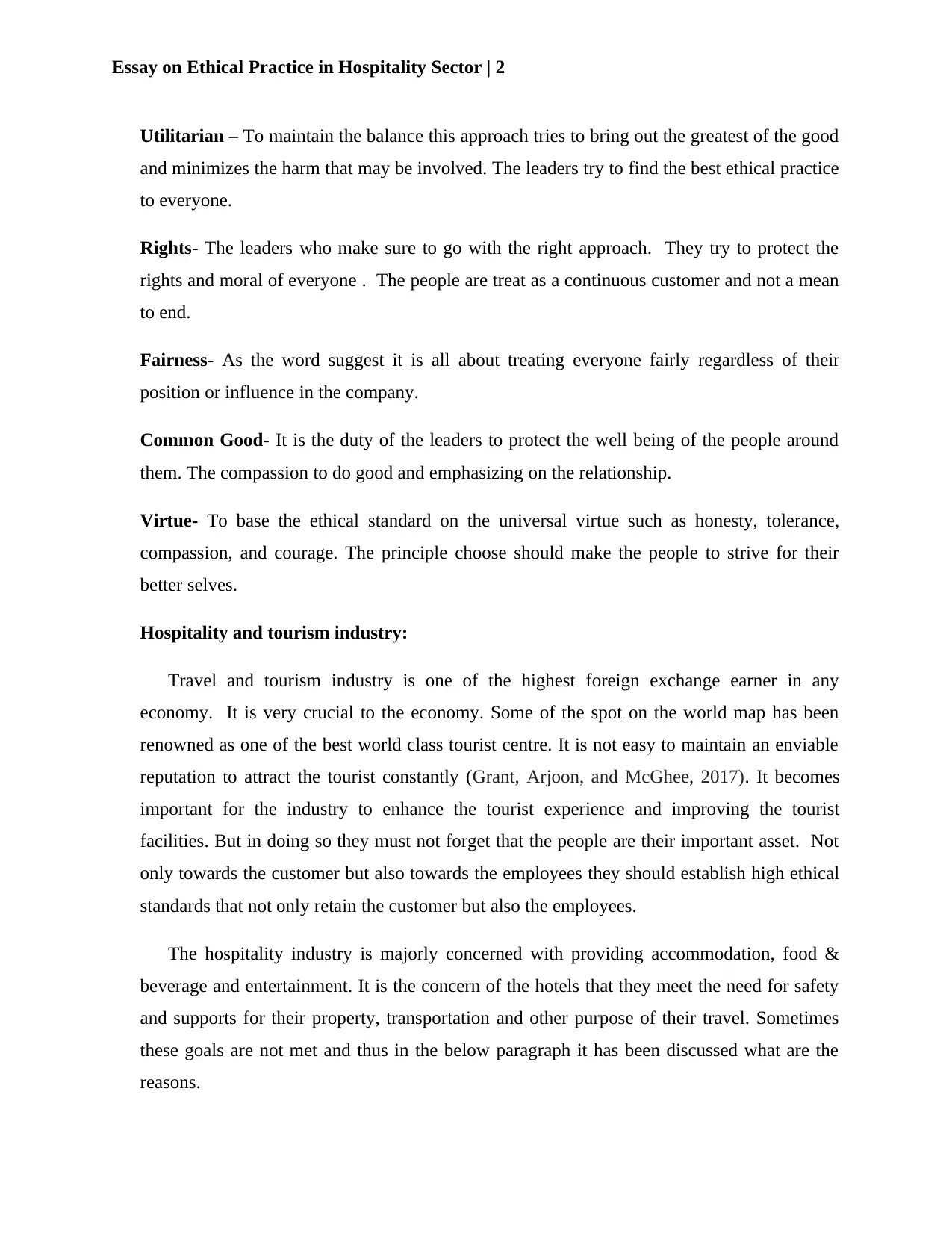
Essay on Ethical Practice in Hospitality Sector | 2
Utilitarian – To maintain the balance this approach tries to bring out the greatest of the good
and minimizes the harm that may be involved. The leaders try to find the best ethical practice
to everyone.
Rights- The leaders who make sure to go with the right approach. They try to protect the
rights and moral of everyone . The people are treat as a continuous customer and not a mean
to end.
Fairness- As the word suggest it is all about treating everyone fairly regardless of their
position or influence in the company.
Common Good- It is the duty of the leaders to protect the well being of the people around
them. The compassion to do good and emphasizing on the relationship.
Virtue- To base the ethical standard on the universal virtue such as honesty, tolerance,
compassion, and courage. The principle choose should make the people to strive for their
better selves.
Hospitality and tourism industry:
Travel and tourism industry is one of the highest foreign exchange earner in any
economy. It is very crucial to the economy. Some of the spot on the world map has been
renowned as one of the best world class tourist centre. It is not easy to maintain an enviable
reputation to attract the tourist constantly (Grant, Arjoon, and McGhee, 2017). It becomes
important for the industry to enhance the tourist experience and improving the tourist
facilities. But in doing so they must not forget that the people are their important asset. Not
only towards the customer but also towards the employees they should establish high ethical
standards that not only retain the customer but also the employees.
The hospitality industry is majorly concerned with providing accommodation, food &
beverage and entertainment. It is the concern of the hotels that they meet the need for safety
and supports for their property, transportation and other purpose of their travel. Sometimes
these goals are not met and thus in the below paragraph it has been discussed what are the
reasons.
Utilitarian – To maintain the balance this approach tries to bring out the greatest of the good
and minimizes the harm that may be involved. The leaders try to find the best ethical practice
to everyone.
Rights- The leaders who make sure to go with the right approach. They try to protect the
rights and moral of everyone . The people are treat as a continuous customer and not a mean
to end.
Fairness- As the word suggest it is all about treating everyone fairly regardless of their
position or influence in the company.
Common Good- It is the duty of the leaders to protect the well being of the people around
them. The compassion to do good and emphasizing on the relationship.
Virtue- To base the ethical standard on the universal virtue such as honesty, tolerance,
compassion, and courage. The principle choose should make the people to strive for their
better selves.
Hospitality and tourism industry:
Travel and tourism industry is one of the highest foreign exchange earner in any
economy. It is very crucial to the economy. Some of the spot on the world map has been
renowned as one of the best world class tourist centre. It is not easy to maintain an enviable
reputation to attract the tourist constantly (Grant, Arjoon, and McGhee, 2017). It becomes
important for the industry to enhance the tourist experience and improving the tourist
facilities. But in doing so they must not forget that the people are their important asset. Not
only towards the customer but also towards the employees they should establish high ethical
standards that not only retain the customer but also the employees.
The hospitality industry is majorly concerned with providing accommodation, food &
beverage and entertainment. It is the concern of the hotels that they meet the need for safety
and supports for their property, transportation and other purpose of their travel. Sometimes
these goals are not met and thus in the below paragraph it has been discussed what are the
reasons.
⊘ This is a preview!⊘
Do you want full access?
Subscribe today to unlock all pages.

Trusted by 1+ million students worldwide
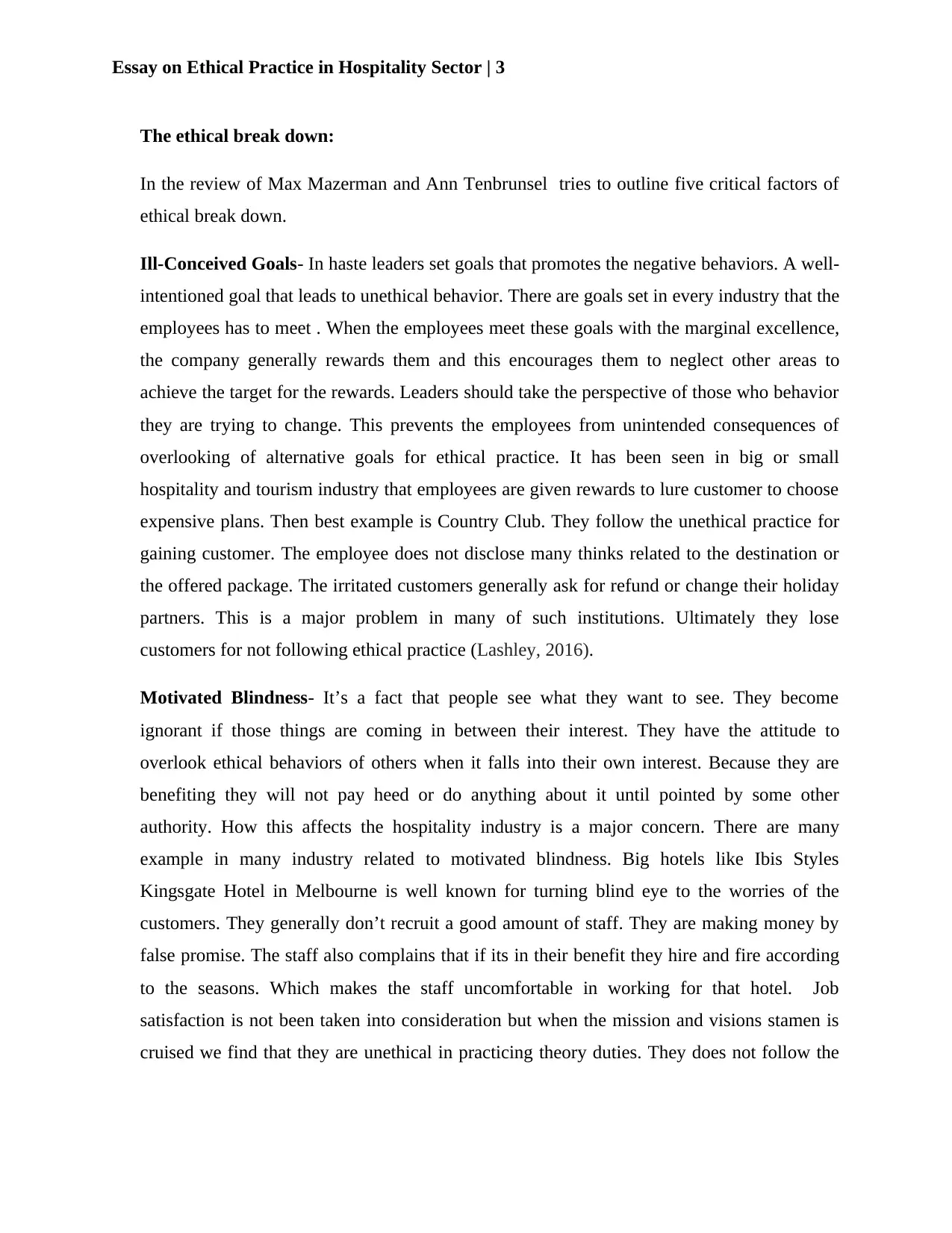
Essay on Ethical Practice in Hospitality Sector | 3
The ethical break down:
In the review of Max Mazerman and Ann Tenbrunsel tries to outline five critical factors of
ethical break down.
Ill-Conceived Goals- In haste leaders set goals that promotes the negative behaviors. A well-
intentioned goal that leads to unethical behavior. There are goals set in every industry that the
employees has to meet . When the employees meet these goals with the marginal excellence,
the company generally rewards them and this encourages them to neglect other areas to
achieve the target for the rewards. Leaders should take the perspective of those who behavior
they are trying to change. This prevents the employees from unintended consequences of
overlooking of alternative goals for ethical practice. It has been seen in big or small
hospitality and tourism industry that employees are given rewards to lure customer to choose
expensive plans. Then best example is Country Club. They follow the unethical practice for
gaining customer. The employee does not disclose many thinks related to the destination or
the offered package. The irritated customers generally ask for refund or change their holiday
partners. This is a major problem in many of such institutions. Ultimately they lose
customers for not following ethical practice (Lashley, 2016).
Motivated Blindness- It’s a fact that people see what they want to see. They become
ignorant if those things are coming in between their interest. They have the attitude to
overlook ethical behaviors of others when it falls into their own interest. Because they are
benefiting they will not pay heed or do anything about it until pointed by some other
authority. How this affects the hospitality industry is a major concern. There are many
example in many industry related to motivated blindness. Big hotels like Ibis Styles
Kingsgate Hotel in Melbourne is well known for turning blind eye to the worries of the
customers. They generally don’t recruit a good amount of staff. They are making money by
false promise. The staff also complains that if its in their benefit they hire and fire according
to the seasons. Which makes the staff uncomfortable in working for that hotel. Job
satisfaction is not been taken into consideration but when the mission and visions stamen is
cruised we find that they are unethical in practicing theory duties. They does not follow the
The ethical break down:
In the review of Max Mazerman and Ann Tenbrunsel tries to outline five critical factors of
ethical break down.
Ill-Conceived Goals- In haste leaders set goals that promotes the negative behaviors. A well-
intentioned goal that leads to unethical behavior. There are goals set in every industry that the
employees has to meet . When the employees meet these goals with the marginal excellence,
the company generally rewards them and this encourages them to neglect other areas to
achieve the target for the rewards. Leaders should take the perspective of those who behavior
they are trying to change. This prevents the employees from unintended consequences of
overlooking of alternative goals for ethical practice. It has been seen in big or small
hospitality and tourism industry that employees are given rewards to lure customer to choose
expensive plans. Then best example is Country Club. They follow the unethical practice for
gaining customer. The employee does not disclose many thinks related to the destination or
the offered package. The irritated customers generally ask for refund or change their holiday
partners. This is a major problem in many of such institutions. Ultimately they lose
customers for not following ethical practice (Lashley, 2016).
Motivated Blindness- It’s a fact that people see what they want to see. They become
ignorant if those things are coming in between their interest. They have the attitude to
overlook ethical behaviors of others when it falls into their own interest. Because they are
benefiting they will not pay heed or do anything about it until pointed by some other
authority. How this affects the hospitality industry is a major concern. There are many
example in many industry related to motivated blindness. Big hotels like Ibis Styles
Kingsgate Hotel in Melbourne is well known for turning blind eye to the worries of the
customers. They generally don’t recruit a good amount of staff. They are making money by
false promise. The staff also complains that if its in their benefit they hire and fire according
to the seasons. Which makes the staff uncomfortable in working for that hotel. Job
satisfaction is not been taken into consideration but when the mission and visions stamen is
cruised we find that they are unethical in practicing theory duties. They does not follow the
Paraphrase This Document
Need a fresh take? Get an instant paraphrase of this document with our AI Paraphraser
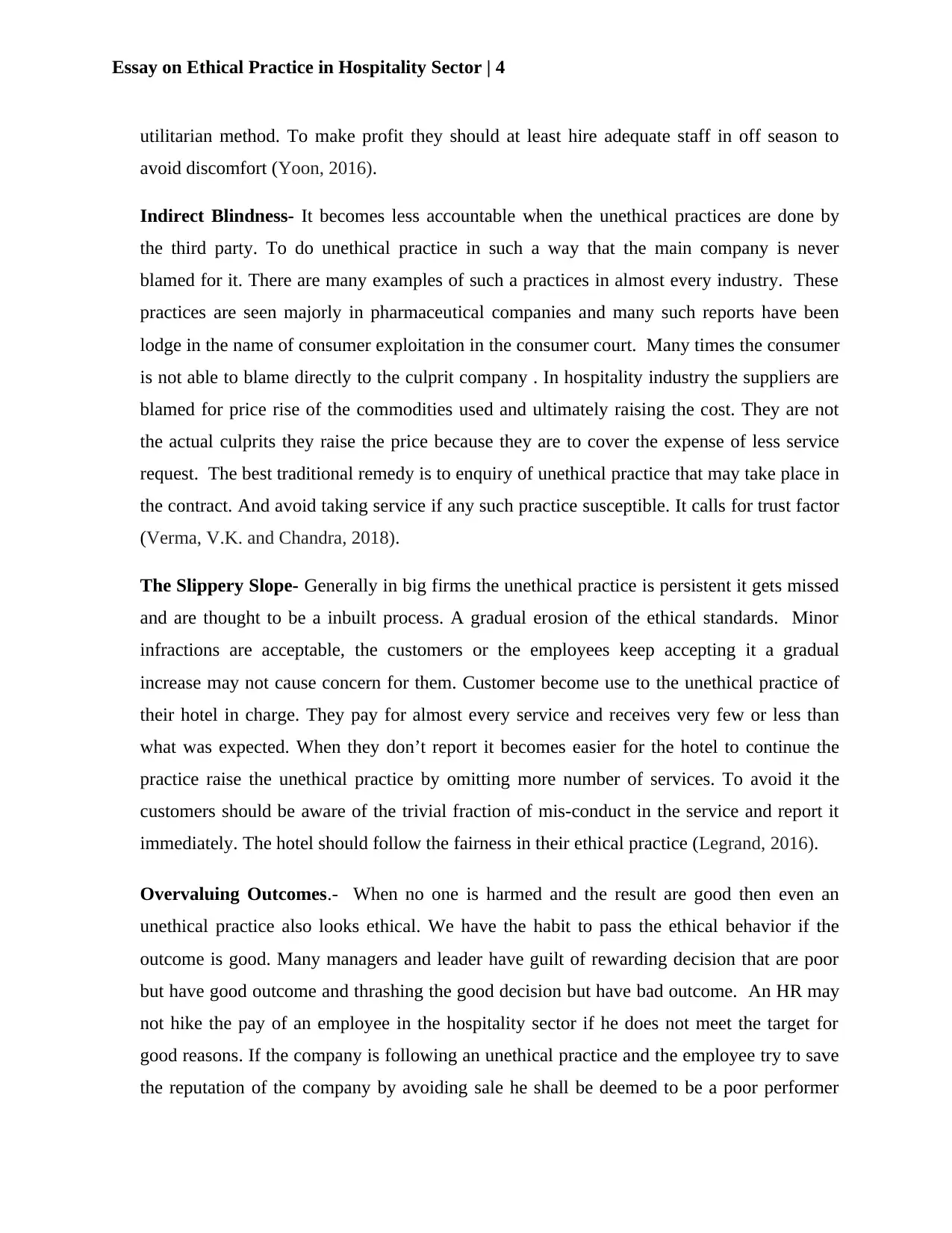
Essay on Ethical Practice in Hospitality Sector | 4
utilitarian method. To make profit they should at least hire adequate staff in off season to
avoid discomfort (Yoon, 2016).
Indirect Blindness- It becomes less accountable when the unethical practices are done by
the third party. To do unethical practice in such a way that the main company is never
blamed for it. There are many examples of such a practices in almost every industry. These
practices are seen majorly in pharmaceutical companies and many such reports have been
lodge in the name of consumer exploitation in the consumer court. Many times the consumer
is not able to blame directly to the culprit company . In hospitality industry the suppliers are
blamed for price rise of the commodities used and ultimately raising the cost. They are not
the actual culprits they raise the price because they are to cover the expense of less service
request. The best traditional remedy is to enquiry of unethical practice that may take place in
the contract. And avoid taking service if any such practice susceptible. It calls for trust factor
(Verma, V.K. and Chandra, 2018).
The Slippery Slope- Generally in big firms the unethical practice is persistent it gets missed
and are thought to be a inbuilt process. A gradual erosion of the ethical standards. Minor
infractions are acceptable, the customers or the employees keep accepting it a gradual
increase may not cause concern for them. Customer become use to the unethical practice of
their hotel in charge. They pay for almost every service and receives very few or less than
what was expected. When they don’t report it becomes easier for the hotel to continue the
practice raise the unethical practice by omitting more number of services. To avoid it the
customers should be aware of the trivial fraction of mis-conduct in the service and report it
immediately. The hotel should follow the fairness in their ethical practice (Legrand, 2016).
Overvaluing Outcomes.- When no one is harmed and the result are good then even an
unethical practice also looks ethical. We have the habit to pass the ethical behavior if the
outcome is good. Many managers and leader have guilt of rewarding decision that are poor
but have good outcome and thrashing the good decision but have bad outcome. An HR may
not hike the pay of an employee in the hospitality sector if he does not meet the target for
good reasons. If the company is following an unethical practice and the employee try to save
the reputation of the company by avoiding sale he shall be deemed to be a poor performer
utilitarian method. To make profit they should at least hire adequate staff in off season to
avoid discomfort (Yoon, 2016).
Indirect Blindness- It becomes less accountable when the unethical practices are done by
the third party. To do unethical practice in such a way that the main company is never
blamed for it. There are many examples of such a practices in almost every industry. These
practices are seen majorly in pharmaceutical companies and many such reports have been
lodge in the name of consumer exploitation in the consumer court. Many times the consumer
is not able to blame directly to the culprit company . In hospitality industry the suppliers are
blamed for price rise of the commodities used and ultimately raising the cost. They are not
the actual culprits they raise the price because they are to cover the expense of less service
request. The best traditional remedy is to enquiry of unethical practice that may take place in
the contract. And avoid taking service if any such practice susceptible. It calls for trust factor
(Verma, V.K. and Chandra, 2018).
The Slippery Slope- Generally in big firms the unethical practice is persistent it gets missed
and are thought to be a inbuilt process. A gradual erosion of the ethical standards. Minor
infractions are acceptable, the customers or the employees keep accepting it a gradual
increase may not cause concern for them. Customer become use to the unethical practice of
their hotel in charge. They pay for almost every service and receives very few or less than
what was expected. When they don’t report it becomes easier for the hotel to continue the
practice raise the unethical practice by omitting more number of services. To avoid it the
customers should be aware of the trivial fraction of mis-conduct in the service and report it
immediately. The hotel should follow the fairness in their ethical practice (Legrand, 2016).
Overvaluing Outcomes.- When no one is harmed and the result are good then even an
unethical practice also looks ethical. We have the habit to pass the ethical behavior if the
outcome is good. Many managers and leader have guilt of rewarding decision that are poor
but have good outcome and thrashing the good decision but have bad outcome. An HR may
not hike the pay of an employee in the hospitality sector if he does not meet the target for
good reasons. If the company is following an unethical practice and the employee try to save
the reputation of the company by avoiding sale he shall be deemed to be a poor performer
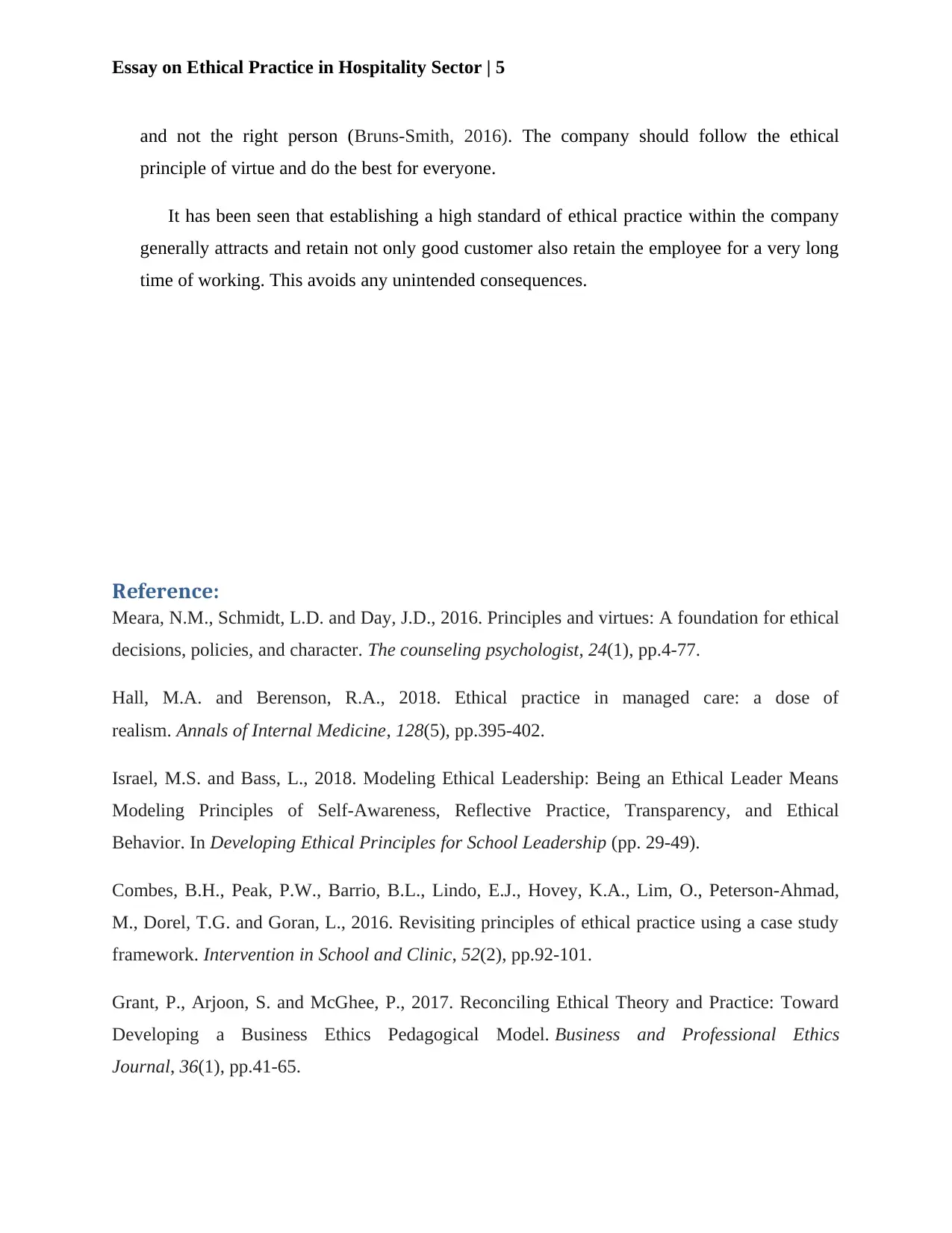
Essay on Ethical Practice in Hospitality Sector | 5
and not the right person (Bruns-Smith, 2016). The company should follow the ethical
principle of virtue and do the best for everyone.
It has been seen that establishing a high standard of ethical practice within the company
generally attracts and retain not only good customer also retain the employee for a very long
time of working. This avoids any unintended consequences.
Reference:
Meara, N.M., Schmidt, L.D. and Day, J.D., 2016. Principles and virtues: A foundation for ethical
decisions, policies, and character. The counseling psychologist, 24(1), pp.4-77.
Hall, M.A. and Berenson, R.A., 2018. Ethical practice in managed care: a dose of
realism. Annals of Internal Medicine, 128(5), pp.395-402.
Israel, M.S. and Bass, L., 2018. Modeling Ethical Leadership: Being an Ethical Leader Means
Modeling Principles of Self-Awareness, Reflective Practice, Transparency, and Ethical
Behavior. In Developing Ethical Principles for School Leadership (pp. 29-49).
Combes, B.H., Peak, P.W., Barrio, B.L., Lindo, E.J., Hovey, K.A., Lim, O., Peterson-Ahmad,
M., Dorel, T.G. and Goran, L., 2016. Revisiting principles of ethical practice using a case study
framework. Intervention in School and Clinic, 52(2), pp.92-101.
Grant, P., Arjoon, S. and McGhee, P., 2017. Reconciling Ethical Theory and Practice: Toward
Developing a Business Ethics Pedagogical Model. Business and Professional Ethics
Journal, 36(1), pp.41-65.
and not the right person (Bruns-Smith, 2016). The company should follow the ethical
principle of virtue and do the best for everyone.
It has been seen that establishing a high standard of ethical practice within the company
generally attracts and retain not only good customer also retain the employee for a very long
time of working. This avoids any unintended consequences.
Reference:
Meara, N.M., Schmidt, L.D. and Day, J.D., 2016. Principles and virtues: A foundation for ethical
decisions, policies, and character. The counseling psychologist, 24(1), pp.4-77.
Hall, M.A. and Berenson, R.A., 2018. Ethical practice in managed care: a dose of
realism. Annals of Internal Medicine, 128(5), pp.395-402.
Israel, M.S. and Bass, L., 2018. Modeling Ethical Leadership: Being an Ethical Leader Means
Modeling Principles of Self-Awareness, Reflective Practice, Transparency, and Ethical
Behavior. In Developing Ethical Principles for School Leadership (pp. 29-49).
Combes, B.H., Peak, P.W., Barrio, B.L., Lindo, E.J., Hovey, K.A., Lim, O., Peterson-Ahmad,
M., Dorel, T.G. and Goran, L., 2016. Revisiting principles of ethical practice using a case study
framework. Intervention in School and Clinic, 52(2), pp.92-101.
Grant, P., Arjoon, S. and McGhee, P., 2017. Reconciling Ethical Theory and Practice: Toward
Developing a Business Ethics Pedagogical Model. Business and Professional Ethics
Journal, 36(1), pp.41-65.
⊘ This is a preview!⊘
Do you want full access?
Subscribe today to unlock all pages.

Trusted by 1+ million students worldwide
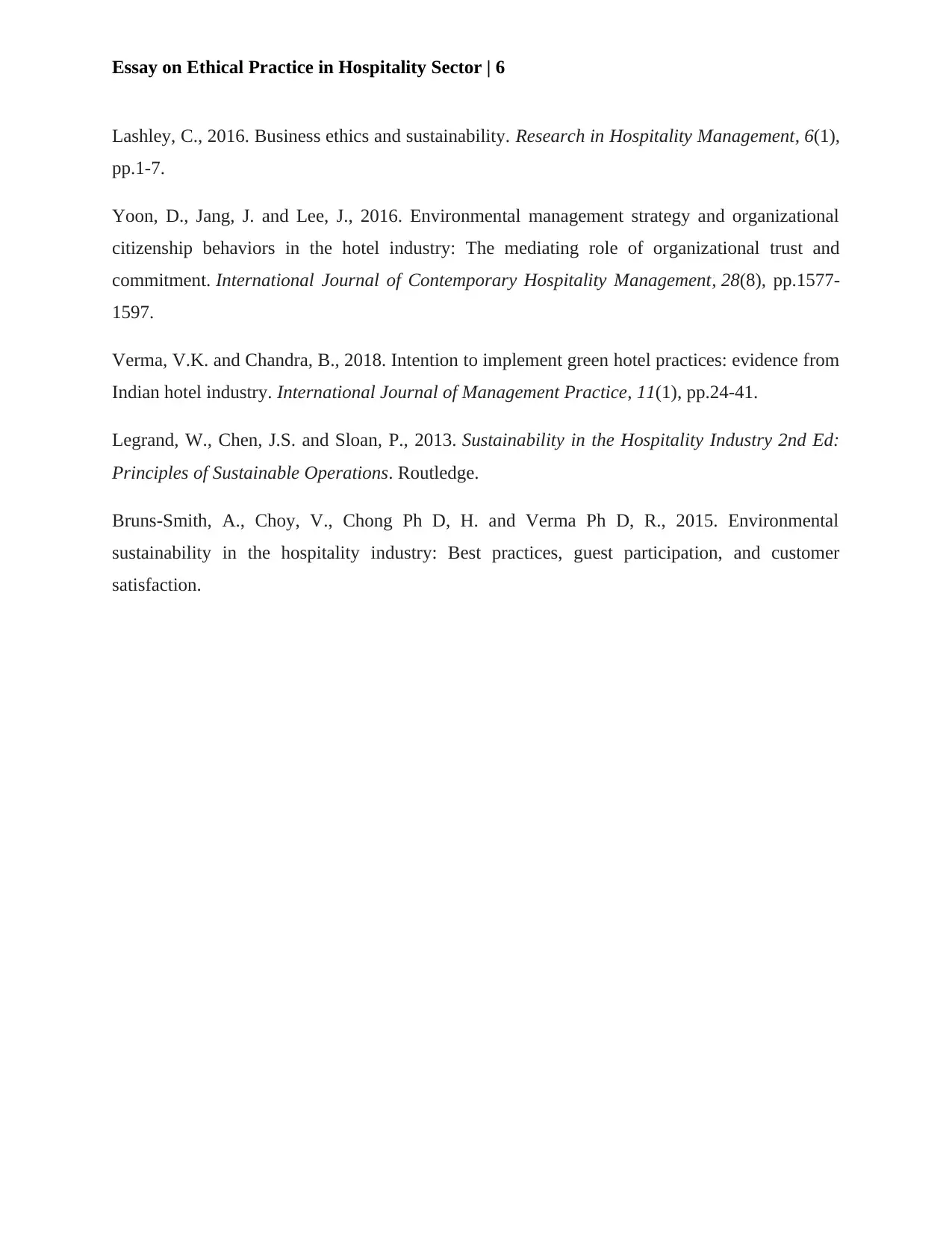
Essay on Ethical Practice in Hospitality Sector | 6
Lashley, C., 2016. Business ethics and sustainability. Research in Hospitality Management, 6(1),
pp.1-7.
Yoon, D., Jang, J. and Lee, J., 2016. Environmental management strategy and organizational
citizenship behaviors in the hotel industry: The mediating role of organizational trust and
commitment. International Journal of Contemporary Hospitality Management, 28(8), pp.1577-
1597.
Verma, V.K. and Chandra, B., 2018. Intention to implement green hotel practices: evidence from
Indian hotel industry. International Journal of Management Practice, 11(1), pp.24-41.
Legrand, W., Chen, J.S. and Sloan, P., 2013. Sustainability in the Hospitality Industry 2nd Ed:
Principles of Sustainable Operations. Routledge.
Bruns-Smith, A., Choy, V., Chong Ph D, H. and Verma Ph D, R., 2015. Environmental
sustainability in the hospitality industry: Best practices, guest participation, and customer
satisfaction.
Lashley, C., 2016. Business ethics and sustainability. Research in Hospitality Management, 6(1),
pp.1-7.
Yoon, D., Jang, J. and Lee, J., 2016. Environmental management strategy and organizational
citizenship behaviors in the hotel industry: The mediating role of organizational trust and
commitment. International Journal of Contemporary Hospitality Management, 28(8), pp.1577-
1597.
Verma, V.K. and Chandra, B., 2018. Intention to implement green hotel practices: evidence from
Indian hotel industry. International Journal of Management Practice, 11(1), pp.24-41.
Legrand, W., Chen, J.S. and Sloan, P., 2013. Sustainability in the Hospitality Industry 2nd Ed:
Principles of Sustainable Operations. Routledge.
Bruns-Smith, A., Choy, V., Chong Ph D, H. and Verma Ph D, R., 2015. Environmental
sustainability in the hospitality industry: Best practices, guest participation, and customer
satisfaction.
1 out of 7
Related Documents
Your All-in-One AI-Powered Toolkit for Academic Success.
+13062052269
info@desklib.com
Available 24*7 on WhatsApp / Email
![[object Object]](/_next/static/media/star-bottom.7253800d.svg)
Unlock your academic potential
Copyright © 2020–2025 A2Z Services. All Rights Reserved. Developed and managed by ZUCOL.





